By: Vanessa Yung、Oasis Li、Yetta LamEdited by: Scout Xu、Yolanda Gao

China's constitutional change may extend tenure of presidency
- 2018-03-07
- Politics
- The Young Reporter
- By: Vanessa Yung、Oasis Li、Yetta LamEdited by: Scout Xu、Yolanda Gao
- 2018-03-07
Reported by Vanessa Yung, Oasis Li and Yetta Lam Edited by Scout Xu and Yolanda Gao China proposed to abolish the current term limits for presidency in the 13th National People's Congress. Removing the requirement that a president "shall serve no more than two consecutive terms" from the constitution could mean Chinese president Xi Jinping remains in his position for years to come. The revision is supported by the public and committees, said Wang Chen, the Secretary-General and Vice Chairperson of the Standing Committee of the National People's Congress. He added that the revision would help centralise and unify the leadership of the Communist Party. Fu King-wa, Associate Professor of Journalism and Media Studies Centre of the University of Hong Kong, said this means future presidents could serve for life. Zhang Baohui, political science professor at Lingnan University, said this proposal violates Deng Xiaoping's reforms to stop another dictator like Mao Zedong. "And it means that China is possibly back to strongman politics," Mr. Zhang said. The committee also proposed adding "Xi Jinping Thought" to the constitution, making Xi the third leader to have his name added behind Mao and Deng. Mr. Zhang said this promotes the cult of personality. "I think the whole package is to create the atmosphere that Xi is the most powerful person in China," Mr. Fu said, "and also to change the legal framework to support him." Chinese social media platform Sina Weibo reached a peak in the number of censored posts last Sunday, Mr. Fu said. He helps run Weiboscope, a project making censored Weibo posts publicly accessible. Sensitive keywords like "proclaim oneself emperor", "long live" and "Xi Zedong," a combination of the names Xi Jinping and Mao Zedong, flooded the platform and were quickly deleted. said Fu. "A lot of people don't want …

Oscars 2018: The results are in!
- 2018-03-05
- Culture & Leisure
- The Young Reporter
- By: Katherine Li、Holly ChikEdited by: Angie Chan、Ezra Cheung
- 2018-03-05
The "most colourful" night of Hollywood is over and all awards this year are presented. The Shape of Water, the movie with 13 nominations, is the biggest winner of the night bringing home four trophies. Here is the list of Oscars 2018 nominations with the winners bold: Best Picture: Call Me by Your Name Darkest Hour Dunkirk Get Out Lady Bird Phantom Thread The Post The Shape of Water Three Billboards Outside Ebbing, Missouri BREAKING: The #Oscar for Best Picture goes to “The Shape of Water.” https://t.co/KyJELjJlTS #Oscars pic.twitter.com/VncaRPrsXU — ABC News (@ABC) March 5, 2018 During the Cold War era in Baltimore in 1962, lonely and mute Elisa (Sally Hawkins) works as a cleaning lady in a high-security government laboratory. Her life forever alters when she and co-worker Zelda (Octavia Spencer) discover a secret project where a mythical humanoid amphibian, living underwater, was held captive, experimented on and then tortured. With the help of Zelda and Giles (Richard Jenkins), Elisa rescues the creature to her own home against life-threatening odds. As the two forms a deeper bond, a romance that transcends race and species unfolds. Director Guillermo del Toro dedicates his Best Picture Oscar for 'The Shape of Water' to 'every young filmmaker.' "This is a door, kick it open and come in." #Oscars A post shared by ABC News (@abcnews) on Mar 4, 2018 at 9:05pm PST Lead Actor: Timothée Chalamet, Call Me by Your Name Daniel Day-Lewis, Phantom Thread Daniel Kaluuya, Get Out Gary Oldman, Darkest Hour Denzel Washington, Roman J. Israel, Esq. Gary Oldman thanks his 98-year-old mother. "Thank you for your love and support. Put the kettle on. I'm bringing Oscar home." https://t.co/lJd891ISOk #Oscars pic.twitter.com/N3HLidEb0t — ABC News (@ABC) March 5, 2018 Lead Actress: Sally Hawkins, The Shape of Water Frances McDormand, Three Billboards Outside Ebbing, Missouri …

Budget 18/19: Hong Kong financial chief attempts to smarten up tourism
- 2018-02-28
- Politics
- The Young Reporter
- By: Amy Ho、Phoebe Lai、Rachel YeoEdited by: Ezra Cheung、James Edward Allen、Kobie Li
- 2018-02-28
In the hope of developing smart tourism in Hong Kong, Financial Secretary, Paul Chan Mo-po, unveils today an additional provision of $396 million for the industry from last fiscal year's recording-breaking surplus of about $138 billion. This yearly budget proposes allocating $226 million to Hong Kong Tourism Board to implement four strategies to boost tourism. One of them is to refine smart tourism measures in a bid to attract more visitors to the city. The move comes in response to the latest 4.5% decrease, reported by the Tourism Commission in 2016, in visitors from around the world altogether. Smart tourism refers to a series of technologically innovative initiatives implemented to enhance sightseers' at-destination experiences. According to a paper from the International Journal on Networked Business in 2015, big data is employed for analysing current tourism trends. The findings then are used to improve current tourist attractions and to bring better accessibility for travellers. Tourism sector lawmaker, Wayne Yiu Si-wing, hopes Hong Kong could make use of such technology to collect data, such as putting sensors on streetlights to track traffic and pedestrian flows. "We hope that the data collected will allow tourists to make better choices when they visit (Hong Kong)," he said. Hong Kong is currently utilising QR codes and Wi-Fi hotspots for some of the smart tourism measures. However, Mr Yiu highlighted that the government could do more to develop Hong Kong into a smarter tourism destination. "For example, Wi-Fi hotspots in the city are still not fast enough because people may gather to use Wi-Fi in the same spot," he explained. Ling Ho, director of cultural tour agency Ho Ho Go Experience, mentioned past measures implemented by the government to improve IT security for tour agencies. "The government has given several hundred thousand dollars for people to set up …

Budget 18/19: Increased housing supply aims at lessening low-income families' burden
- 2018-02-28
- Politics
- The Young Reporter
- By: Anna Kam、Nadia Lam、Tomiris UrstembayevaEdited by: Raphael Blet、Michelle Ng
- 2018-02-28
Reported by Anna Kam, Nadia Lam and Tomiris Urstembayeva Edited by Raphael Blet Infographics edited by Michelle Ng Financial Secretary Paul Chan Mo-po announced today that the government worked on increasing living space for local citizens. This includes expanding housing space for 210 sites which will supply 310,000 flats, 70% of which will be used for public housing. The government said that it would continue to support the demand and supply of housing in Hong Kong. The International Housing Affordability survey conducted in 2017 ranks Hong Kong as the most unaffordable housing market with a median multiple of over 19. According to a research conducted by Mercer assessing 101 cities, Hong Kong ranked 70th in the world in terms of living standards. Alister Musgrave, the Founder of MoneyHero.com.hk, believes that the overall budget failed to address the public concerns on housing. He cites a research conducted by Demographia and found that Hong Kong has the worst housing affordability in the world for 8 years, which is one of the major problems. Despite the government's initiatives to increase the stamp duty taxation in 2017-2018, the housing property continued to rise and did not falter. Shih Wing-ching, the founder of Centaline Property Agency Limited, said that the market-cooling measures initiated by the government in recent years are not effective in the long run. "Take the Stamp Duty as (an) example, although it discourages the investors to purchase properties, it fails to help the real users to buy flats," said Mr. Shih. Many of these flat owners are investors, with the government taking the initiative to increase both public and private flats at 100,000 and 280,000 respectively. Still, the financial secretary did not roll out any policies to aid first-time home buyers. Mr. Shih suggests that the government should provide more housing supply …

Budget 18/19: the challenges and the road forward in Hong Kong
- 2018-02-28
- Politics
- The Young Reporter
- By: Katherine Li、Wallis WangEdited by: Candice Wong、Wing Li
- 2018-02-28
Reported by Katherine Li and Wallis Wang Edited by Candice Wong Infographics edited by Wing Li The Hong Kong government's budget surplus has reached $138 billion and the fiscal reserves are expected to reach $1.09 trillion, Financial Secretary, Paul Chan Mo-po revealed today in his budget speech. Hong Kong's economy grew by 3.8% over the past fiscal year. The financial secretary predicts that the gross domestic product will increase by between 3% and 4% in the coming year. Mr. Chan said he is "cautiously optimistic" about economic prospects in the coming year, based on the global monetary environment and geopolitical situations. Trends in innovation and technology, the shift in global economic gravity from West to East, protests against free trade and the call for de-globalisation and protectionism pose challenges, Mr. Chan pointed out. "To stay ahead of the game, we must enhance our I&T (Innovation and Technology) environment (and) attract companies from new economic sectors and research institutions to set up their presence in Hong Kong," Mr. Chan said. To overcome these challenges, Mr. Chan proposed to set aside $50 billion for I&T development. An additional $10 billion will be injected into a Technology and Innovation Fund, $500 million of which will go toward a Technology Talent Scheme. To fight protectionism, Mr. Chan called for more cooperation with the Mainland while maintaining a competitive tax regime. "The Belt and Road Initiative and the Bay Area development serve to enlarge the hinterland for business development of our enterprises and expand our market coverage," Mr. Chan said. However, legislator and practising tax lawyer, Kenneth Leung Kai-cheong warned about the risks for Hong Kong. "I believe we should diversify Hong Kong's market," Mr. Leung said, "because protectionism sentiment and the change of interest rate in the US will affect trade and investment." He …

Budget 18/19: healthcare expenditure increased while no specific plans on mental health mentioned
- 2018-02-28
- Politics
- The Young Reporter
- By: Vanessa Yung、Oasis LiEdited by: Elly Wu、Kenji Chan
- 2018-02-28
Reported by Vanessa Yung, Oasis Li Edited by Kenji Chan Infographics edited by Elly Wu Financial Secretary Paul Chan Mo-po announced to increase the public healthcare services expenditure to HK$ 71.2 billion, accounting for 17.5% of total recurrent expenditure. The government provided the Hospital Authority with nearly $6 billion to increase the number of hospital beds, operating theatre sessions, the quota for general out-patient and specialist out-patient services and the manpower required. Because of the increasing demand for healthcare services, the government has invited the Hospital Authority to start planning the second 10-year hospital development plan, which is expected to deliver 3,000 to 4,000 additional hospital beds and provide additional facilities and quota for consultation. A sum of $300 billion as an initial provision is set to support this second 10-year hospital development plan, as well as improving the clinic facilities in Department of Health, upgrading and increasing healthcare teaching facilities. To address the shortage of manpower in hospitals, the government is discussing with the University Grants Committee to increase publicly-funded training capacities for doctors, nurses, dentists, and relevant allied health professionals in the coming three years. "I will ensure that the Hospital Authority has adequate resources to employ all local medical graduates," Chan said. Yuen Wai Kit, the spokesperson for Health Policy Concern, thinks the government should not only be focusing on the shortage of doctors. "The budget allocated resources to increase the number of doctors. What about other medical manpower such as nurses and occupational therapists? The society lacks all sorts of medical manpower instead of only lacking doctors," said Yuen. Mental health care is not mentioned in the budget. Hong Kong currently has 240,900 people suffering from mental illness, of whom 32,000 are teenagers, while the Hospital Authority is not providing a stable support for mental health …
